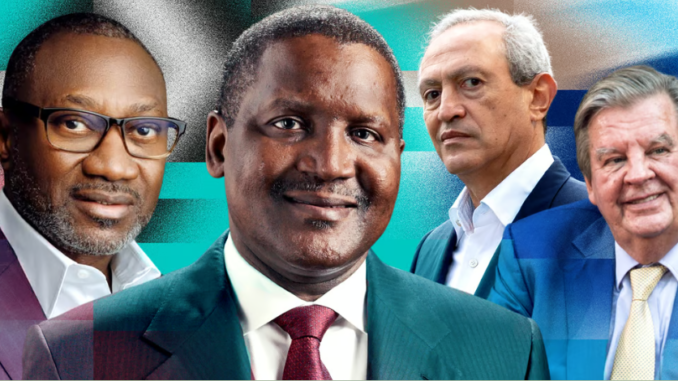
The fortunes of Africa’s wealthiest people have rebounded slightly in the past 12 months, reversing the decline in their fortunes from a year ago, though they are still off their all-time highs.
The 20 billionaires on the 2024 Forbes list of Africa’s Richest are worth a combined $82.4 billion. That’s up $900 million from last year’s $81.5 billion.All of that gain can be attributed to the return of Nigeria’s Femi Otedola, who last appeared on the Forbes Africa list in 2017 when he held a controlling stake in fuel distributor Forte Oil. Otedola phased out his oil investments during a government push to privatize the country’s energy business in 2013, using a Forte subsidiary to purchase Geregu, a public power generation plant.
He owned about 90% of Geregu when it was listed on the Nigerian exchange’s Main Board in 2022, but has since sold shares to institutional investors, which include Afreximbank’s Fund for Export Development in Africa and the State Grid Corporation of China. His 73% stake in Geregu is worth more than $850 million, about three-quarters of his $1.1 billion fortune, which puts him at No. 20 on the list.After taking Otedola’s comeback into account, Africa’s billionaires dipped slightly, but still fared better than the decline of 4% last year, when African markets faded in sync with equity values around the world.
This year, African equities joined a late-year global rally, with the S&P All Africa index rising 10% in the final two months of 2023 but still ended down more than 9% in the 12 months through January 8, 2024.The continent remains one of the world’s toughest places to build – and hold onto – a billion-dollar fortune, as global investors remain leery of its stock exchanges, businesses struggle against strained economies, poor infrastructure and volatile exchange rates, while changing political winds can make, boost or bust private fortunes. As a result, says Charles Robertson, head of macro strategy at asset manager FIM Partners, entrepreneurs often face limited access to capital and populations with little disposable income to invest in new companies or the stock market.
A turbulent 2023 also made African equities less attractive for foreign investors. “You’ve got two negatives for investors. Weakening domestic [currencies], which is pushing up inflation, and tax rises, which is hurting the companies they’re investing in,” says Robertson. “Central banks have been hiking rates as well, so you’ve had big rate hikes and currency weakness and tax rises all at once.
And if there was any chance that mix wasn’t going to deter all foreign investors, then throw in multiple coups happening, and it just created a very nasty storm.”That environment favors entrenched family fortunes or those with close ties to government that continue to dominate the ranks of Africa’s richest. Nigeria’s Alike Dangote, whose fortune rose $400 million to $13.9 billion, claimed the ranking’s No. 1 spot for the 13th year in a row, despite the political uncertainty following the February presidential election and a devaluation of the naira in 2023 that offset the rising share price of Dangote Cement.
South African luxury goods magnate Johann Rupert held onto the No. 2 spot with $10.1 billion, down from $10.7 billion in 2023 as shares of his Compagnie Financiere Richemont–maker of Cartier watches and Montblanc pens – slid. South African Nicky Oppenheimer, who formerly ran diamond mining firm DeBeers before selling it to mining firm Anglo American a decade ago, ranks No. 3, with $9.4 billion, up $1 billion from 2023 .
Thirteen of the billionaires added to their fortunes this year, while seven saw their net worth decline. South Africa’s Christoffel Wiese, who rejoined the ranking last year at No. 18 with $1.1 billion after rebounding from an accounting scandal, holds onto his no. 18 rank with a $1.2 billion net worth, thanks to rising shares of his largest holding, Shoprite, and the spinoff of food business Premiere Group from Brait PLC. Wiese also cashed out on $50 million worth of Shoprite stock in October, reducing his stake in the supermarket chain. The biggest decline on this year’s list belongs to Algerian industrial magnate Issad Rebrab, who a court barred in May from exercising any commercial or management duties at his conglomerate Cevital. Rebrab, who denied any wrongdoing, had previously served 8 months in jail on corruption charges until his release in January 2020. Rebrab, who shares the wealth with his wife and five children – including his son, Malik, who took over as CEO in 2022 – saw his net worth fall by almost half to $2.5 billion.
The biggest gain belongs to Egypt’s Nasseff Sawiris, who added $1.4 billion to $8.7 billion thanks to a rise in Addidas shares (he owns about 6%), as well as dividends from the German sneaker company and family conglomerate OCI. This year South Africa claims six spots on the ranking, followed by Egypt with five and Nigeria with four. Algeria, Tanzania, and Zimbabwe each have one billionaire on the list, while Morocco has two. Forbes used stock prices and currency exchange rates from Jan. 8, 2024, to measure the net worths. Additional reporting by John Hyatt and Jemima McEvoy.
METHODOLOGYOur list tracks the wealth of African billionaires who reside in Africa or have their primary business there, thus excluding Sudanese-born billionaire Mo Ibrahim, a U.K. citizen, and South African Nathan Kirsh, who operates out of London. Strive Masiyiwa, a citizen of Zimbabwe and a London resident, appears on the list because of his telecom holdings in Africa.Net worths were calculated using stock prices and currency exchange rates from the close of business on Jan. 8, 2024. To value privately held businesses, we start with estimates of revenues or profits and apply prevailing price-to-sale or price-to-earnings ratios for similar public companies. Some list members grow richer or poorer within weeks or days of our measurement date.
